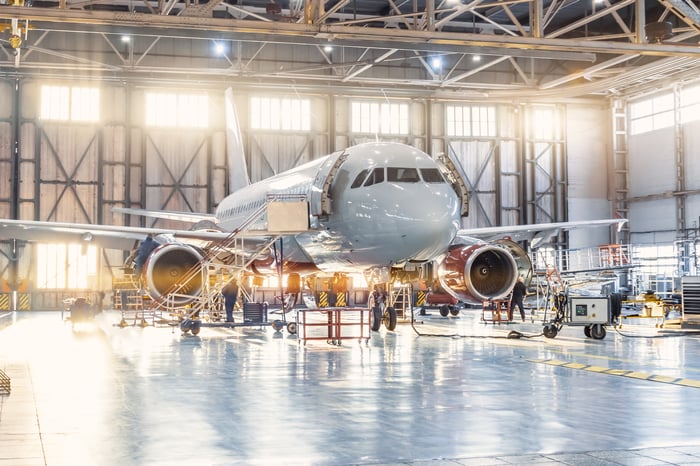The COVID-19 pandemic has devastated airlines, and weighs heavily on aerospace companies that rely on aviation for substantial portions of their revenue. Boeing (BA 1.51%), for example, has lost about half of its value in 2020, and some suppliers further down the food chain have been hit harder.
Heico (HEI 1.01%)has held up better than most, but it too is feeling the impact of the pandemic. Here's a look at how Heico has fared through the crisis, and whether the stock is an attractive buy today.
A diverse set of businesses
Heico is best known as an aerospace supplier, but it is its non-commercial aerospace businesses that have done the heavy lifting so far in 2020. The company generates about half of its sales from the defense, space, medical, and electronics end markets, and those units have been able to offset some of the weakness in airline-related revenue.
The company in late August reported fiscal third-quarter results that beat consensus estimates on both earnings and revenue, thanks in large part to the businesses contained within its electronic technologies unit. The non-flight businesses grew sales by 4% through the first nine months of Heico's fiscal year, generating a 29% operating margin. Flight support revenue, by comparison, was down 20% year over year for the same period.

Image source: Getty Images.
Heico has a relatively clean balance sheet, with total long-term debt of $739 million, or about 38% of shareholder equity. The company has no significant debt maturities until fiscal 2023, and feels good enough about its liquidity position that it has continued to aggressively shop for acquisitions during the pandemic. Nine months into Heico's fiscal year, the company has made six small acquisitions.
When will aerospace come back?
The electronics businesses have kept more serious trouble at bay amid the pandemic, but if it's going to prosper again, Heico will need a comeback in the aviation sector. Management believes that the company's specific role in the commercial aerospace supply chain will help it to recover faster than a lot of original equipment manufacturers including Boeing.
Heico's business is focused primarily on aftermarket sales of replacement parts. As airlines slowly recover from this plunge in travel demand and rebuild their flight schedules, they are likely to lean heavily on their existing fleets rather than further stretching their balance sheets with new aircraft purchases. That should drive more business to companies like Heico.
It largely built its portfolio of aerospace products through small acquisitions, and many of its replacement products are engineered as updated versions of the parts they are replacing. For that reason, a large number of the parts it sells can make older planes more fuel-efficient and cheaper to operate. That makes it easier for airlines to justify purchasing the parts even in the middle of a downturn.
"We believe demand for our favorably priced commercial aviation products and services will return in advance of the overall market recovery," said Eric A. Mendelson, Heico's co-president and head of its flight support group, in the August release. "Furthermore, we believe our cost-saving solutions and robust product development programs will enable us to potentially increase market share and emerge with a stronger presence within the commercial aviation market."
I think Heico is correct that aftermarket sales will recover more quickly than the overall aviation sector, though it remains to be seen how much its product mix will enhance the company's rebound. There are also new risks for aftermarket vendors. For example, airlines that have large numbers of surplus planes sitting parked could choose to scavenge them for some spare parts rather than buying new parts from vendors. That said, Heico's portfolio should hold up better than those of other, more commoditized, aerospace vendors.
Is Heico a buy?
Early in the pandemic, I described Heico a the top choice for investors looking to buy into commercial aerospace. That's proven to be good advice, as its share price did not fall quite as far as its commercial aerospace rivals and it has recovered from the decline faster.
Aerospace company data by YCharts
There's arguably less uncertainty now, though the outlook is still grim. It appears major airlines will be able to survive COVID-19 without liquidations, but their recoveries will take years, not quarters.
I still think aftermarket companies will recover before new equipment manufacturers, and Heico still appears to be a safer bet for investors who want to invest in a commercial aerospace recovery and are willing to wait out the storm.
The only issue is that the stock has recovered much more quickly than the companies that provide its end markets, and Heico is no value stock. It currently trades at 55 times forward earnings estimates, and 7.7 times expected sales. For reference, back in January, it was cheaper on those valuation metrics, with a forward PE ratio of 45 and a forward sales ratio of 6.5.
Heico is a solid company worth holding on to if you own it, but given its valuation and the slow expected pace of a recovery, it's not a stock I'm rushing out to buy today. There are other intriguing ways to invest in an eventual aviation rebound without having to pay that premium valuation.




